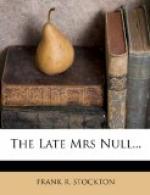The cows had been milked, some by a rotund black woman named Letty, and some, much to their discomfort, by Plez himself, and it was beginning to grow dark, when an open spring wagon driven by a colored man, and with a white man on the back seat came along the road, and stopped at the gate. The driver having passed the reins to the occupant on the back seat, got down, opened the gate, and stood holding it while the other drove the horse into the road which ran by the side of the field to the house behind the trees. At this time a passer-by, if there had been one, might have observed, partly protruding from behind some bushes on the other side of the public road, and at a little distance from the gate, the lower portion of a purple umbrella. As the spring wagon approached, and during the time that it was turning into the gate, and while it was waiting for the driver to resume his seat, this umbrella was considerably agitated, so much so indeed as to cause a little rustling among the leaves. When the gate had been shut, and the wagon had passed on toward the house, the end of the umbrella disappeared, and then, on the other side of the bush, there came into view a sun-bonnet of the same color as the umbrella. This surmounted the form of an old lady, who stepped into the pathway by the side of the road, and walked away with a quick, active step which betokened both energy and purpose.
The house, before which, not many minutes later, this spring wagon stopped, was not a fine old family mansion like that of Midbranch, but it was a comfortable dwelling, though an unpretending one. The gentleman on the back seat, and the driver, who was an elderly negro, both turned toward the hall door, which was open and lighted by a lamp within, as if they expected some one to come out on the porch. But nobody came, and, after a moment’s hesitation, the gentleman got down, and taking a valise from the back of the wagon, mounted the steps of the porch. While he was doing this the face of the negro man, which could be plainly seen in the light from the hall door, grew anxious and troubled. When the gentleman set his valise on the porch, and stood by it without making any attempt to enter, the old man put down the reins and quickly descending from his seat, hurried up the steps.
“Dunno whar ole miss is, but I reckon she done gone to look after de tukkies. She dreffle keerful dat dey all go to roos’ ebery night. Walk right in, Mahs’ Junius.” And, taking up the valise, he followed the gentleman into the hall.
There, near the back door, stood the rotund black woman, and, behind her, Plez. “Look h’yar Letty,” said the negro man, “whar ole miss?”
“Dunno,” said the woman. “She done gib out supper, an’ I ain’t seed her sence. Is dis Mahs’ Junius? Reckon’ you don’ ’member Letty?”
“Yes I do,” said the gentleman, shaking hands with her; “but the Letty I remember was a rather slim young woman.”
“Dat’s so,” said Letty, with a respectful laugh, ’but, shuh ’nuf, my food’s been blessed to me, Mahs’ Junius.”




